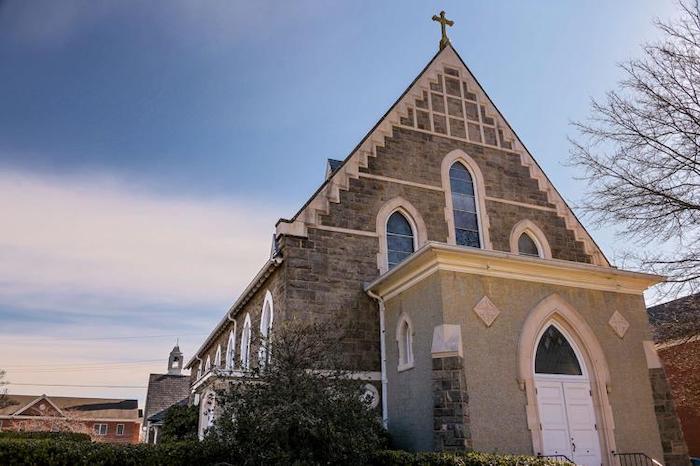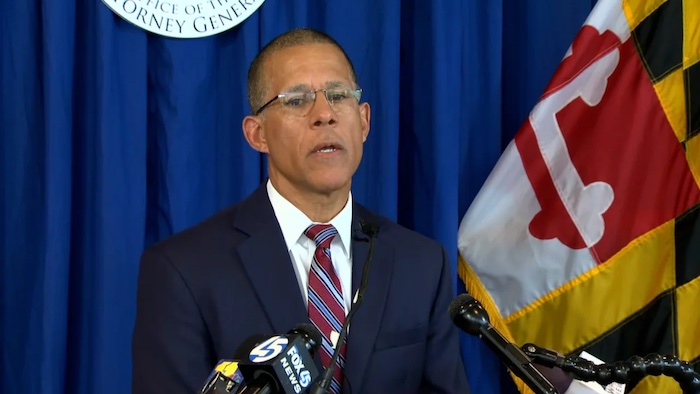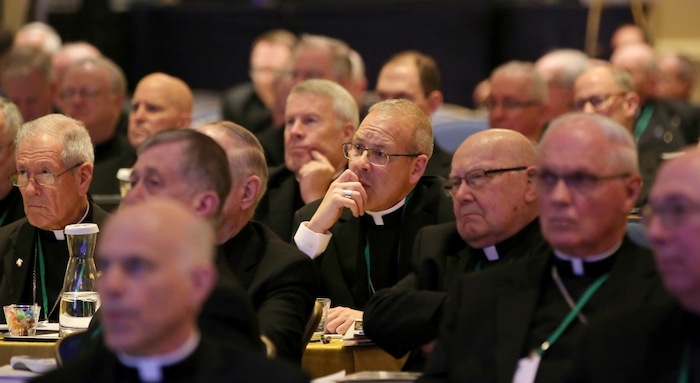— The clergymen lived and worked at St. Mark Parish in Catonsville from 1964 to 2004, according to a state attorney general’s report.

By Corky Siemaszko
On the day after Easter, the pastor of a Roman Catholic parish in Maryland that was home to a dozen priests accused of sexual abuse will be saying the rosary for their victims.
The Rev. Santhosh George made the announcement on the homepage of the St. Mark Church in Catonsville on Thursday, the day after that the state’s top prosecutor accused the Archdiocese of Baltimore of covering up the sexual abuse of more than 600 children for over a half-century.
“I write with a heavy heart to share the news of the release of a report issued by the Attorney General of Maryland, which outlines horrific abuse by some priests of the Archdiocese of Baltimore in years past,” George wrote. “In particular, is the sickening notification of several sexual abusers of children living and working here at St. Mark between the years of 1964 and 2004.”
Of the 156 priests in the report, 12 served stints at St. Mark, which was founded in 1888 about 10 miles west of Baltimore in downtown Catonsville. The attorney general said 11 accused priests served at St. Mark, but NBC News counted 12 in the report.
George, in the note to his flock, did not say how many of the 600 victims accounted for in the report were past or current parishioners. But he apologized to them all.
“While there is little I can do to make amends for this, I do offer you my prayers and extend myself to you should you want to talk,” he wrote, adding that the rosary service would be held at 7 p.m. Monday and that several more services for the victims would be held over the next few weeks.
George, which is an Anglicization of his given last name, Kozhippadan, has only been pastor of St. Mark since July 2021, long after the bulk of the alleged sexual abuse described in the report occurred.
And, unlike most of his predecessors, George had to prove he wasn’t a sex offender before taking the helm of the parish, archdiocesan spokesman Christian Kendzierski said in an email.
“St. Mark’s employees and Fr. George and anyone employed at St. Mark’s follow the same policy…criminal background checks — including a check of the sex offender registry,” Kendzierski wrote. “All employees and volunteers must complete training on preventing and reporting child abuse.”
David Clohessy, a sex abuse victims advocate at the Survivors Network of Those Abused by Priests, or SNAP, said that because the Catholic Church is struggling with a severe shortage of priests, the bishops “let their clergy slide on matters like this.”
While the AG’s report noted that St. Mark had been home to the biggest number of accused priests, Kendzierski insisted the parish was not a magnet for predator priests. He said the archdiocese did not know these priests were accused of sexual abuse when they were assigned to St. Mark.
“While recognizing the horrific scope of past child sexual abuse, it is not true that the 11 priests were sent to St. Mark’s after the Archdiocese had knowledge of an allegation of child sexual abuse,” Kendzierski wrote.
State Attorney General Anthony Brown, in his damning report, named 12 priests who served at St. Mark. He also said the leaders of the archdiocese knew that problem priests were being moved from parish to parish.
“Time and again, members of the Church’s hierarchy resolutely refused to acknowledge allegations of child abuse for as long as possible,” he said. “When denial became impossible, Church leadership would remove abusers from the parish or school, sometimes with promises that they would have no further contact with children.
“Church documents reveal with disturbing clarity that the Archdiocese was more concerned with avoiding scandal and negative publicity than it was with protecting children.”
Back in 2002, when it was first revealed that a large number of accused priests had served at St. Mark, church officials dismissed it as a coincidence and noted it is one of the archdiocese’s biggest parishes, so it makes sense that a lot of priests would log time there.
Terry McKiernan of Bishop Accountability, a nonprofit that monitors abuse allegations against Catholic priests and officials, said it may not be a simple coincidence that so many alleged predators wound up at St. Mark. He said “clusters” of predatory priests have been found in certain parishes.
“Yes, priests who do this kind of thing do tend to congregate, they seek each other out,” McKiernan said. “But the bigger issue are the higher-ups who are aware of these priests and assign them to parishes that have had other problem priests.”
And one of the higher-ups in the Archdiocese of Baltimore, the report stated, was a now-dead former priest accused of abuse named Thomas Bauernfeind.
Prior to serving as interim pastor at St. Mark from 1978 to 1979, Bauernfeind “worked as Assistant Chancellor and Vice Chancellor in the Chancery of the Archdiocese from 1968 to 1975, and he served as Chancellor from 1975 to 1978,” the AG’s report stated.
“In these roles, while he was abusing children himself, he was responsible for overseeing much of the work of the Archdiocese and was involved in many personnel matters,” the report stated.
The fact that Bauernfiend only spent a year at St. Mark is also a red flag, McKiernan said.
“To move somebody a year after he gets there is weird,” McKiernan said. “He was not accused of sexual abuse at that parish, but there had to be a reason why he was moved out of there so quickly. Also, before he was assigned to St. Mark, he was a chancellor in the archdiocese and was involved in personnel matters and things like that. So he was a problem priest who probably knew who the other problem priests were.”
Kendzierski said he could not explain why Bauernfeind only spent a year at St. Mark because the archdiocese turned over all the documents from that era to the AG’s office.
In the AG’s report, it said Bauernfeind in 1987 admitted abusing a 16-year-old girl a decade earlier. It said that in 2002 a second female victim reported “extensive abuse by Bauernfeind while he was Chancellor.”
Bauernfeind was already retired when the second woman came forward, and he died in 2003, the report stated.
During the 1970s, four other accused priests were assigned to St. Mark. They were identified in the report as Marion Helowicz, David Smith, James Dowdy and Frederick Duke.
The Baltimore Sun reported in 2002 that Smith pleaded guilty to “perverted sexual practice” after a then-45-year-old man came forward and accused Smith of plying him with beer before molesting him at the St. Mark rectory between 1973 and 1976. It is unclear whether Smith is deceased.
Helowicz pleaded guilty in 1988 to committing “perverted sexual acts” with a learning-disabled teenage boy while serving as an associate pastor at St. Stephen Church in Kingsville, which is also a Baltimore suburb, according to The Washington Post.
Records indicate Helowicz is now 77 and living near downtown Baltimore. He did not return a call placed to his home.
The other accused priests who lived and worked at St. Mark Parish were identified as Robert Lentz and Ronald Belschner, who were there in the 1960s; Edward Heilman and Charles Rouse, who were there in the 1980s; and Ross LaPorta, Francis Ernst and Henry Zerhusen, who were there in the 1990s.
LaPorta, Ernst, Duke, Lentz, Zerhusen, Bauernfeind and Heilman are listed as dead in the report. When asked if any of the other priests were still alive, Kendzierski referred to an earlier archdiocesan list of accused priests that also lacked that information.
NBC News, however, was able to track down Dowdy, who is 79 and lives in another Baltimore suburb. Reached by telephone, Dowdy acknowledged he was a former priest but declined to discuss the allegations laid out in the AG report that he repeatedly preyed on teenage boys.
“I really don’t want to talk about that,” he said.
Dowdy, who the report showed was associate pastor at St. Mark from 1975 to 1980, also insisted he did not angle to be sent to that parish.
“The idea that I had any choice in going there is a crock of crap,” he said. “I was just assigned there.”
Complete Article ↪HERE↩!




